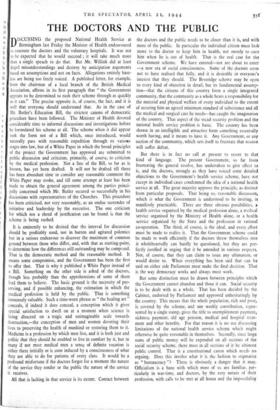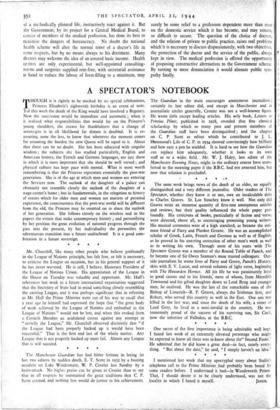THE DOCTORS AND THE PUBLIC
DDISCUSSING the proposed National Health Service at Birmingham last Friday the Minister of Health endeavoured to reassure the doctors and the voluntary hospitals. It was not to be expected that he would succeed ; it will take much more than a single speech to do that. But Mr. Willink did at least dispel misunderstandings and destroy by anticipation arguments based on assumptions and not on facts. Allegations entirely base- less are being too freely voiced. A published letter, for example, from the chairman of a local branch of the British Medical Association, affirms in its first paragraph that " the Government appears to be determined to rush their scheme through as quickly as it can." The precise opposite is, of course, the fact, and it is well that everyone should understand that. As in the case of Mr. Butler's Education Bill, the strictest canons of democratic procedure have been followed. The Minister of Health devoted considerable time to informal discussions and investigations before he formulated his scheme at all. The scheme when it did appear took the form not of a Bill which, once introduced, would naturally pass with reasonable expedition through its various stages into law, but of a White Paper in which- the broad principles of the project the Government has approved are submitted to public discussion and criticism, primarily, of course, to criticism by the medical profession. Not a line of the Bill, so far as is known, has yet been drafted. It will not be drafted till there has been abundant time to consider any reasonable comment the White Paper may evoke, and till some attempt at least has been made to obtain the general agreement among the parties princi- pally concerned which Mr. Butler secured so successfully in his discussions with representatives of the Churches. This procedure has been criticised, not very reasonably, as an undue surrender of initiative and leadership by the executive. The one criticism for which not a shred of justification can be found is that the scheme is being rushed.
It is eminently to be desired that the interval for discussion should be profitably used, not in barren and agitated polemics but in a serious endeavour to discover the maximum of common ground between those who differ, and, with that as starting-point, to determine how the differences still outstanding may be composed. That is the democratic method and the reasonable method. It means some compromise, and the Government has been the first to offer that. That is why it published a White Paper instead of a Bill. Something on the other side is asked of the doctors, though less probably than the apprehensions of some of them lead them to believe. The basic ground is the necessity of pre- serving, -and if possible enhancing, the estimation in which the medical profession is held by the public. That is something immensely valuable. Such a time-worn phrase as " the healing art " conceals, if indeed it does conceal, a conception which it gives special satisfaction to dwell on at a moment when science is being directed on a tragic and unimaginable scale towards destruction,—the conception of men and women devoting their lives to preserving the health of mankind or restoring them to it. Medicine is a profession by which men live, and it is both just and politic that they should be enabled to live in comfort by it, but in many if not most medical men a sense of definite vocation is either there initially or is soon induced by a consciousness of what they are able to do for patients of every class. It would be a profound misfortune if the doctors forgot for a moment the nature of the service they render or the public the nature of the service it receives.
All that is lacking in that service is its extent. Contact between the doctors and the public needs to be closer than it is, and with more of the public. In particular the individual citizen must look more to the doctor to keep him in health, not merely to cure him when he is out of health. That is the real case for the Government scheme. We have entered—not are about to enter —a new era of social consciousness. Some of the doctors seem not to have realised that fully, and it is desirable in everyone's interest that they should. The Beveridge scheme may be open to every kind of objection in detail, but its fundamental assump- tion—that the citizens of this country form a single integrated community, that the community as a whole bears a responsibility for the material and physical welfare of every individual to the extent of securing him an agreed minimum standard of subsistence and all the medical and surgical care he needs—has caught the imagination of the country. That aspect of the social security problem and the national health service problem is basic. The country has been shown in an intelligible and attractive form something essentially worth having, and it means to have it. Any Government, or any section of the community, which sets itself to frustrate that resolve will suffer defeat.
But there is in fact no call at present to resort to that kind of language. The present Government, so far from frustrating the general resolve, has undertaken to give effect to it, and the doctors, strongly as they have voiced some detailed objections to the Government's health service scheme, have not except in individual cases condemned the idea of a national health service at all. The great majority approve the principle, as distinct from particular proposals. That being so, reasonable discussion, which is what the Government is understood to be inviting, is manifestly practicable. There are three obvious possibilities, a health service organised by the medical profession alone, a medical service organised by the Ministry of Health alone, or a health service organised by the State and the profession in rational co-operation. The third, of course, is the ideal, and every effort must be made to realise it. That the Government scheme could be made to work efficiently if the doctors threw themselves into it wholeheartedly can hardly be questioned, but they are per- fectly justified in urging that it be amended in various respects. Not, of course, that they can claim to issue any ultimatum, or would desire to. When everything has been said that can be said on either side Parliament must make the final decision. That is the way democracy works and always must work.
But some distinction must be drawn between principles which the Government cannot abandon and those it can. Social security is to be dealt with as a whole. That has been decided by the Cabinet, endorsed by Parliament and approved unhesitatingly by the country. This means that the whole population, rich and poor, is covered by the scheme, and one weekly contribution, repre- sented by a single stamp, gives the title to unempldyment payment, sickness payment, old age pension, medical and hospital treat- ment and other benefits. For that reason it is no use discussing limitations of the national health service scheme which might otherwise be quite reasonable in themselves. Secondly, since large sums of public money will be expended on all sections of the social security scheme, there must in all sections of it be ultimate public control. That is a constitutional canon which needs no arguing. Does this involve what it is the fashion to stigmatise as " bureaucracy "? There is obviously a danger that it may. Officialism is a bane with which most of us are familiar, par- ticularly in war-time, and doctors, by the very nature of their profession, with calls to be met at all hours and the impossibility of a methodically planned life, instinctively react against it. But the Government, by its project for a Central Medical Board, to consist of members of the medical profession, has done its best to minimise the dangers of bureaucracy. No doubt the national health scheme will alter the normal tenor of a doctor's life in some respects, but by no means always to his detrithent. Many doctors may welcome the idea of an assured basic income. Health centres are only experimental, but well-appointed consulting- rooms and surgeries supplied rent-free, with secretarial assistance at hand to reduce the labour of form-filling to a minimum, may surely be some relief to a profession dependent more than most on the domestic service which it has become, and may remain, so difficult to secure. The question of the choice of doctors, and the relation of private to public practice, raises real problems which'it is necessary to discuss dispassionately, with two objectives, the protection of the doctor and the service-of the public, always kept in view. The medical profession is offered the opportunity of proposing constructive alternatives to the Government scheme. By turning to mere denunciation it would alienate public sym- pathy fatally.



























 Previous page
Previous page